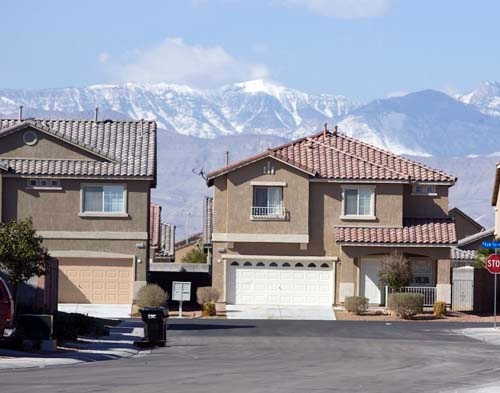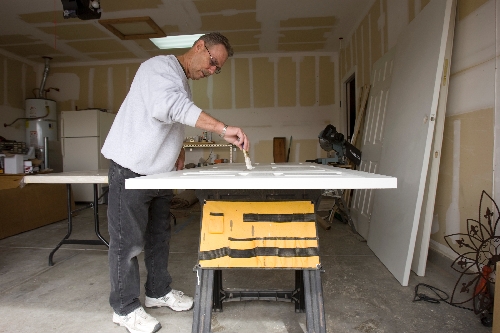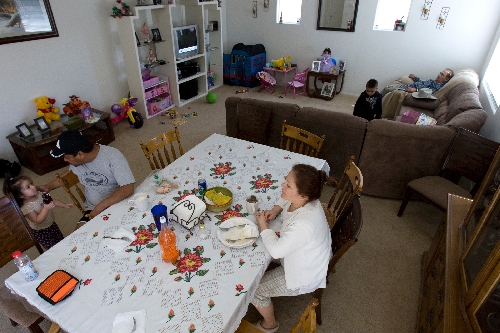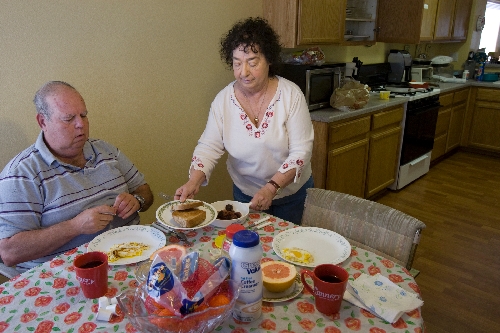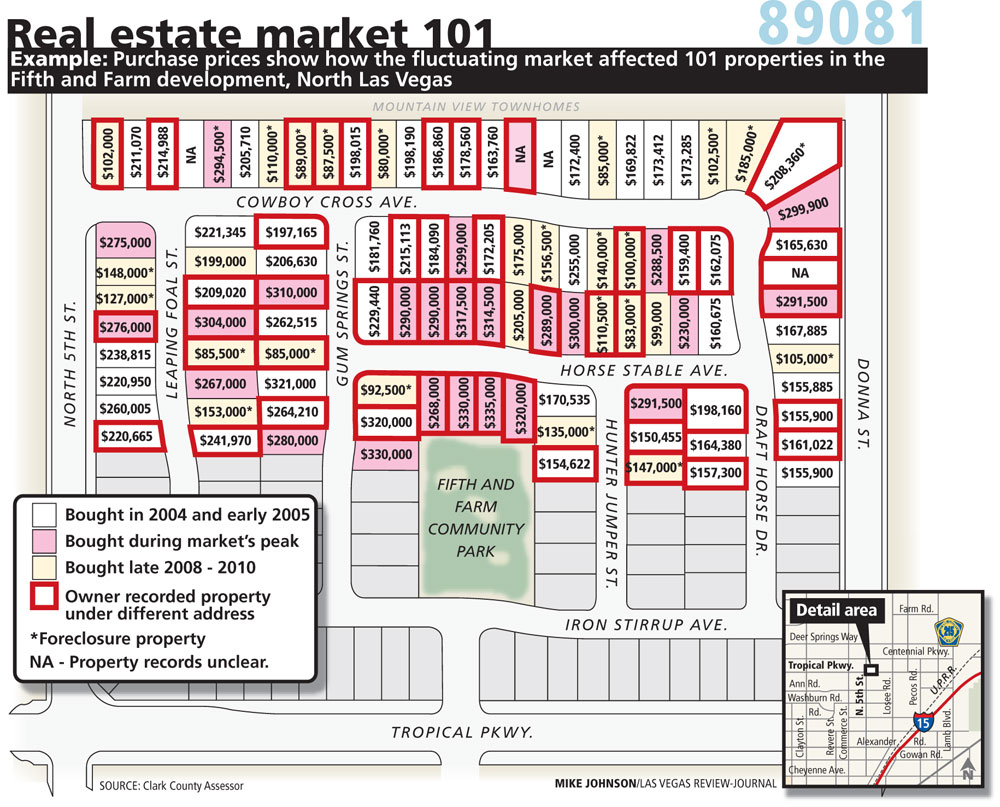Fortunes rise and fall for one North Las Vegas neighborhood
When Charles Riley paid $330,000 for a two-story house on the outskirts of North Las Vegas, there was plenty of work for an experienced painter like him. He paid off his compressors, generators and other equipment, and took out a second mortgage.
"We got into one of those ARM (adjustable rate) mortgages, and the second year we were in this house the (monthly) rate went up, and then it went up again, and it kept going up," Riley, 45, said. "We were freaking out. ... It was crazy."
Although circumstances for Riley, his girlfriend and their three young boys were hard then, they are desperate now. Riley hasn't worked for a year, and the family is living on his girlfriend's salary as a pharmaceutical-research worker while trying to make monthly payments on two mortgages and to a bankruptcy trustee, Riley said.
Their attorney is trying to eliminate the second mortgage, Riley said. If successful, they can reduce their overall debt payment to $1,900 a month.
"Even if they take off the second mortgage, the loan we are paying off is $264,000, which is about $150,000 more than this house is worth," he said. "I am like 60 percent of the people out there. Somebody has to do something to help these people out because they are struggling to keep their homes."
The Fifth and Farm subdivision that includes Cowboy Cross Avenue, near North Fifth Street and Tropical Parkway, was built in 2004 and 2005 during the wave of construction in and around North Las Vegas' massive Aliante community, which was touted at the time as the new Summerlin or Green Valley.
Now, in North Las Vegas, one in 15 homes has been foreclosed on, and values in every neighborhood have plummeted, according to city officials.
Property records for 101 homes on or next to Cowboy Cross Avenue show 50 were owned by the original buyer, who purchased for roughly between $150,000 and $220,000; 25 had been purchased in 2006 or 2007 for as much as $330,000 and $325,000.
But over the past 18 months, 26 homes were purchased for prices between $80,000 and $185,000. And, all but a few of those sales followed foreclosures. Seven homes since late last year sold for less than $100,000.
Approximately half the homes are investor-owned rentals, and a sampling of 25 homes showed assessed and taxable values dropped 32 percent from the previous year to the current one, compared with a 27 percent decrease across Southern Nevada.
The neighborhood is a case study of the region's foreclosure crisis and a cautionary tale of what lies ahead for neighborhoods consumed by investors. The property values skyrocketed overnight, but since have fallen to a third of what they were three years ago.
Throughout Clark County, approximately 25,000 homes built during the boom years from 2004 through 2007 have been involved in foreclosures since 2007, according to county property data. Yet during that flood of foreclosures, only 24,700 homes built over the two prior decades, from 1980 to 1999, were involved.
Furthermore, from 2007 through 2009, two-thirds of Clark County homes involved in foreclosures were investor-owned rentals, according to county property data.
'I feel bad ... but I don't feel sorry'
Down the street, on Cowboy Cross, a foreclosure opened the door for Doug McKesson, who late last year purchased for $87,500 a single-story home for his son and daughter-in-law.
The home cost half the $190,000 McKesson paid in 2007 for his own place nearby, and less than a third of the $298,614 debt left on the Cowboy Cross home by the previous owner. That debt, according to property records, was about $30,000 higher than the previous purchase price.
"Anybody who signed up for a mortgage with a balloon payment deserves what they got," McKesson said. "People thought 'I will sell it in two years' and the people who couldn't got stuck. They did it. Nobody twisted their arm. ... I feel bad for the people who did the balloon payments, but I don't feel sorry for them."
Of the 25 homes on the north side of Cowboy Cross, six sold last year for $85,000 to $110,000 following a foreclosure, and last month foreclosure notices were posted on two other vacant homes. That means a third of those homes have been foreclosed upon since last year. Three purchased for rock-bottom prices sit side-by-side. Two doors down in each direction are homes that sold for $294,500 and $265,000 a couple years earlier.
Despite the drop in values, or the fact that nearly half of the nearby homes are owned by investors, McKesson isn't worried about the investment.
"I don't care that the value has dropped. If I was going to sell it, I would care, but I am not," he said. "With prices so low right now, me and my friends (from Southern California) can come up and buy properties."
losing the 'moral obligation to pay'
A few doors east on Cowboy Cross, Terry Connolly said he followed "the rules" in 2004 before he bought a brand new home. He calculated his income-to-loan ratio to make sure he could afford the mortgage. He researched the neighborhood, the developer and the outlook for local real estate, he said.
Six years later, Connolly has stopped paying his mortgage and intends to walk away from the single-story house he purchased for $163,000; in part because it's worth far less but also because the senior citizen fears for his wife's safety and his own.
Like others who moved to the neighborhood when homes were first built, Connolly said out-of-town landlords a couple years ago, after Southern Nevada's unemployment rate began to rise, started leasing homes to low-income tenants who receive government assistance with their rent.
"When you do everything the proper way, and then you see it crumble around you because of what other people did -- the banks, the speculators -- then you start to lose any feeling that you have a moral obligation to pay the loan," Connolly said.
With one low-income family living nearby, and with another neighboring home vacant and in foreclosure, Connolly worries his neighbors soon will be tenants who receive government assistance.
Connolly insists he is not a bigot. However -- with dozens of children playing in the street, a "boyfriend" or "uncle" soliciting neighbors for bus fare or lunch money and barbecues for 15 to 20 family members in a nearby driveway -- it's clear the neighborhood has nose-dived, he said.
"When you move into a new neighborhood with single-family homes, you expect that you would be living in a middle-class-type area -- no better or no worse," Connolly said. "How do I get this neighborhood back to the middle-class neighborhood like the one I moved into?"
'I couldn't keep doing it'
Across Cowboy Cross, the Najera sisters, their spouses and their families are more worried about keeping a roof over their heads than about the declining value of the home they bought for $300,000 in 2006.
With six adults employed in the two-story house, the family had always paid its mortgage because each had a job in construction or fast food. However, most have been laid off since October, and wages of one fast-food cook aren't sufficient to make the $2,100 payment, Ocabeth Najera Alvarez, 40, said in Spanish through an interpreter.
Considering the number of construction jobs in Southern Nevada dropped 27 percent last year and with double-digit vacancy rates across the real estate market, local experts don't expect construction to pick up soon.
About a year ago, the extended family tried to lower their mortgage, Najera Alvarez said. After the bank demanded documents the family had already submitted and resubmitted, the bank in December said the application was processed, she said. A few weeks later, however, the bank said it had not received the forms and that they should start over.
"Since the whole process already took a year, in truth, I don't know what's going to happen," Najera Alvarez said.
After getting laid off in October, Najera Alvarez late last year worked for a friend cleaning beauty salons, she said. The job required more time than expected, so her pay was less than minimum wage, she said.
"At one point I was working 10-hour days, sweeping out four salons, two kitchens and six bathrooms," she said, tears welling in her eyes. "I couldn't keep doing it. I finally had to apply for WIC to make sure I had enough to feed my daughter." WIC is a government food program for low-income women, infants and children up to 5 years old.
Najera Alvarez said her family might lose their home, but that moving in with relatives in Chicago or California would simply increase their burden.
"I don't see that there's any solution for us," she said.
'we are not going to live long enough ...'
Donna Reardon, a retired school teacher, and Jim Conroy long ago made plans to move from the East Coast to Las Vegas, but the journey was postponed for several years because they stayed behind to care for an elderly relative.
Now, five years after they arrived, the couple last month received their first foreclosure notice after the bank refused to lower the mortgage or authorize a short sale of their one-time "dream home."
"We are not going to live long enough to recoup our purchase price," Conroy, 56, said of the home bought in August 2004 for $211,070. "I blame the banks. If they weren't making credit available for people who had no business buying a home, they (developers) wouldn't have built all these homes."
When Reardon and Conroy arrived, North Fifth Street was a dead end at the entrance to the subdivision. The Las Vegas Beltway had not been built, and there was nothing but desert between their backyard and the mountains to the north. Amid such solitude, the odor from the nearby RC Farms pig farm and the roar of jets departing Nellis Air Force Base were forgivable nuisances.
Today, however, an apartment building blocks their view and North Fifth connects with the Beltway. With neighboring homes selling for half what the couple owes on their loan, they refuse to pay their mortgage. With their bank unwilling to lower their payment, Reardon and Conroy are not sure where they will go when they get kicked out.
"I have always taken responsibility for my actions. I look at the forces that got us here, and I blame the banks," Reardon said. "All this (retirement) was planned for so long and it all went up in smoke."
Across the subdivision, that echo can be heard over and over from other original buyers.
'if you're not going to live here ...'
Miles Cunnelle recently stopped paying the mortgage on his Draft Horse Drive home while he simultaneously attempts to lower his payment and plans to move out before long.
"I am not going to continue to throw money into a black hole," Cunnelle, 75, said. "I would be 120 years old before we get even with the way it is. The only thing to do with this is save your money and walk away."
Unlike other original homeowners, however, Cunnelle not only blames the banks for turning his neighborhood upside-down. He also points to developers and North Las Vegas City Council members who allowed them to build thousands of homes in just a few years.
"They didn't put a limit on building. It went rampant and now it's overbuilt," Cunnelle said. "Meanwhile, the banks are handing out money like it's water."
The retiree acknowledges his quality of life has eroded with the influx of low-income tenants. He is considering moving to South Carolina. There, he said, a home on four acres costs $90,000.
"I blame the people who built the place just so investors could buy the homes," Cunnelle said. "If you are not going to live there, you don't get to buy here."
'They should get to know us ...'
Around the corner, a Cowboy Cross home leased to low-income tenants, who receive government assistance is owned by investor Sudeep Dhillon, a veterinarian from the posh Black Mountain area north of San Diego where the average home cost about $500,000 in 2006.
Dhillon, who owns four of the 101 homes analyzed in the Cowboy Cross neighborhood, said the property-management company he employs, Lifestyle Real Estate, started two years ago renting to tenants who receive government assistance. However, he said it's not possible for tenants to be a nuisance because the Fifth and Farm Homeowners Association deploys security that enforces its rules to prevent vandalism and other problems.
"The homeowners association won't let that happen," Dhillon said by phone from his animal clinic. "They don't spare anybody because they make their money by finding faults."
Dhillon referred additional questions to his property manager. When contacted, James Rodriguez, from Lifestyle Real Estate, declined comment.
One of Dhillon's tenants, Chentill Bias, 30, who acknowledged she and her four, young children receive Section 8 government assistance, said she understands her neighbors' frustration, but she isn't about to move because they don't want her nearby. Bias moved in a year ago, in part because her sister and her children -- also Section 8 tenants -- live near Cowboy Cross.
"I moved here because its a lot more peaceful than where I used to live," she said of her former home near Cheyenne Avenue and Walnut Road in North Las Vegas. "There is not that much drug activity and not as much gangs. ... It's a lot safer for my children."
She said many low-income tenants act inappropriately, and they leave all Section 8 tenants with an undeserved, bad reputation.
"They (neighbors) should get to know us before they pass judgment on us," Bias said.
Not everyone, however, is griping about the neighbors.
'The neighbors haven't bothered me ...'
On nearby Hunter Jumper Street, Ralph Bernstein can't help but grin when discussing the $135,000 cash he paid 15 months ago for his single-story home.
Although more recent sales just doors away have gone for as little as $85,000, the retiree is not worried he will lose on his investment. In fact, the $400 he saved on property taxes this year will help pay for gasoline, he said.
"I am not complaining because I am not planning on selling it. I am retiring here," Bernstein, 69, said. "I am happy that the value has gone down from the purchase price because it means my taxes will go down also."
Bernstein and his wife moved to Las Vegas from Southern California. Since the print shop he once owned went under, Bernstein considered himself fortunate to pay for his home through an inheritance.
Bernstein is not worried about investor-owned rentals. His home is very quiet even when the street is filled with children playing, he said.
"I am the token white guy," Bernstein said. "The neighbors haven't bothered me, except for the guy the other night who was fixing his car with rap music playing loud."
'Everybody was trying to make money'
If Bernstein's timing was good, Joseph Bennett's was terrible.
In early 2007, when home values were skyrocketing $10,000 or more a month, Bennett and his wife took out a half-million dollars in loans and plotted to ride Las Vegas' real estate bubble to prosperity.
Bennett, 47, was already paying off a Las Vegas home when he received two more loans, one for a second home he purchased for $250,000 and another for a third, on Cowboy Cross, he purchased for $294,500.
Now, Bennett, an unemployed bus driver and nursing assistant, has lost his first two homes to foreclosure and is at risk of losing his Cowboy Cross home even though the lender agreed to reduce his payments.
"They say they will give me three years before they hit me with larger payments," Bennett said. "At $1,800 a month, I can handle it. If they raise it and I don't have work and can't pay for it, I will ask the bank to lower it again, or I will have to leave."
Three years ago, he rented out his first house, near Nellis Boulevard and Stewart Street. Tenants paid at first. Then, they paid sporadically before the bank foreclosed and he lost that house, Bennett said.
After Bennett moved to Cowboy Cross, his 18-year-old son, a bellboy at that time, and the boy's girlfriend, a department store employee, moved into the second home, near Martin Luther King Boulevard and Alexander Street, and took over payments. Nearly a year ago, the bank foreclosed on that home after the couple lost their jobs. Now the couple, along with Bennett's grandchildren, live in government housing.
Bennett doesn't single out the banks or investors such as himself for causing the housing crisis but said lenders should reduce payments for people whose debt far exceeds their home's value.
"Everybody was trying to make money," Bennett said. "It was going good for everybody, and, then, all of a sudden, the economy went down. We lost our jobs, and we got hurt."
Bennett said if he doesn't find work soon, he might have to move into his son's public housing unit.
"There are plenty of homes on the market for cheap, but where are you going to find a job?" Bennett said. "That is the problem here. There is not any work."
'we are stuck ...'
Across Cowboy Cross, a knock at the door of the Tillman family home summons three dogs, two little children, the kids' mother and their grandmother.
If it weren't for Patrick Tillman, an Air Force specialist who bought the home with a Veterans Administration loan, most likely his mother, sister, niece and nephew would have nowhere else to go, Slyvia Tillman, 47, said.
"If my son wasn't in the military, we would be homeless," she said. "If the military doesn't keep giving him help, we will be on the street."
Patrick Tillman paid $156,500 in December 2008 for a single-story home. According to property records, a lender foreclosed on the original owner four months earlier. The unpaid debt on the earlier loan was $179,168 even though the original, 2004 purchase price was $168,385.
Since Tillman's purchase 15 months ago, a house three doors down sold for $100,000 and another across the street sold for $85,000. Lenders had foreclosed on both of those homes before the latest sales, according to property records.
The Tillmans wish they could move, but they can't, Sylvia Tillman said. She said the homeowners association is so diligent in enforcing its rules -- which forbid car repairs in the driveway and parking cars in the yard -- that Cowboy Cross is like "living in a communist country."
"We are stuck until my son gets out of the military. He got the home loan from the VA and there is no way he can sell it for less than he owes on it," Sylvia Tillman said. "We are from Alabama. And, when you pay $200,000 for a house there, you get a mansion."
Sylvia Tillman's daughter, Tiffany Lyons, 20, said the lack of jobs makes it impossible to care for her family without her brother's help.
"It's aggravating," she said. "I am a single parent with two kids. I can't get credit, and I can't afford right now to establish any credit."
'i have nothing against them, but ...'
Around the corner, on Gum Springs, Rudy Trotter is found asking a stranger if they might be from the homeowners association so that he can lodge a complaint.
Trotter, a computer administrator who drives a luxury sports car, said he and his wife are leaving the neighborhood because their quality of life has deteriorated.
The couple had high hopes when they purchased a two-story house for $262,000 when the homes were first built. It was their first home, and their commitment to it can be seen today in the well-trimmed appearance of the property.
"My wife and I are moving because of the people who rent Section 8 housing. I have nothing against them, but they do not keep up their property," Trotter, 45, said, while pointing to shattered glass and a broken cardboard box in the gutter and then to dead plants in nearby yards.
The homeowners association claims it will keep landlords accountable for tenants, but the appearance of neighboring properties continues to upset him, he said. Trotter blames out-of-town landlords: the generic investors who spread themselves too thin and thus lost homes to foreclosure, or the generic investors who leased to low-income tenants when the economy soured.
With regard to the foreclosure crisis, he blames "predatory lenders" for offering loans to people who didn't qualify.
While a victim of the plunge in property values, Trotter is also a beneficiary. He and his wife are moving into a $315,000 home nearby which in 2006 was selling for nearly $600,000, he said. Trotter said he plans to lease the Gum Springs home, which he acknowledges will make him one of the absent landlords he hates. Unlike others, however, he won't lease to low-income tenants, Trotter said.
"The difference is that I have an investment in this place and will be here to check on it and keep it up," Trotter said.
'values can't go much lower ...'
When Andrew Kershaw paid nearly $300,000 in May 2007 for his two-story home on Draft Horse Drive, he thought he and his dog had escaped city crime and squalor. Three years later, he knows he was mistaken.
"I thought this was going to be the next Green Valley. I thought I would move as far north as possible to get away from the city and the crime, but it has caught up with me, and I am surrounded by it again," he said. Off-duty Las Vegas police officer Trevor Nettleton was slain not far away in November, and the nearest convenience store was recently robbed at gunpoint, Kershaw said.
Kershaw is not happy with the influx of low-income tenants, but the local-government employee said he isn't worried about public-sector layoffs, and he plans to live in the house for years to come.
"In cities back East, the people on welfare seem to all be in the same neighborhood," Kershaw said. "But, out here, they are waving to you as you leave to go to work."
Considering one single-story home three doors from Kershaw sold in the past seven months for $102,000, and another nearby for $105,000, after a foreclosure, Kershaw can only hope values someday return to the price he paid.
"Values can't go much lower because that would be like 1940s prices," he said. "I just want it (house) to be worth more when I leave than it was when I moved in."
Contact reporter Frank Geary at fgeary@reviewjournal.com or 702-383-0277.
Videos and Slide shows
PART TWO
STEMMING THE TIDE
In Southern Nevada, far fewer people than expected have received home loan modifications through a $75 billion stimulus program designed to reduce the effect of foreclosures on communities.
COMING MONDAY



